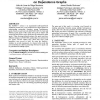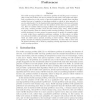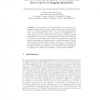2490 search results - page 33 / 498 » The Generalized Theory of Model Preference |
CSB
2005
IEEE
14 years 2 months ago
2005
IEEE
In the feature selection of cancer classification problems, many existing methods consider genes individually by choosing the top genes which have the most significant signal-to...
ATAL
2005
Springer
14 years 2 months ago
2005
Springer
The PartNET++ system is an experimental multi-agent-based simulation tool that uses a new model based on hyper-graphs for understanding partnership formation among heterogeneous a...
CORR
2010
Springer
13 years 8 months ago
2010
Springer
The stable marriage problem is a well-known problem of matching men to women so that no man and woman, who are not married to each other, both prefer each other. Such a problem ha...
IDEAL
2007
Springer
14 years 2 months ago
2007
Springer
The dependence of the classification error on the size of a bagging ensemble can be modeled within the framework of Monte Carlo theory for ensemble learning. These error curves ar...
CIE
2005
Springer
14 years 2 months ago
2005
Springer
We define the notion of ordinal computability by generalizing standard Turing computability on tapes of length ω to computations on tapes of arbitrary ordinal length. The general...



